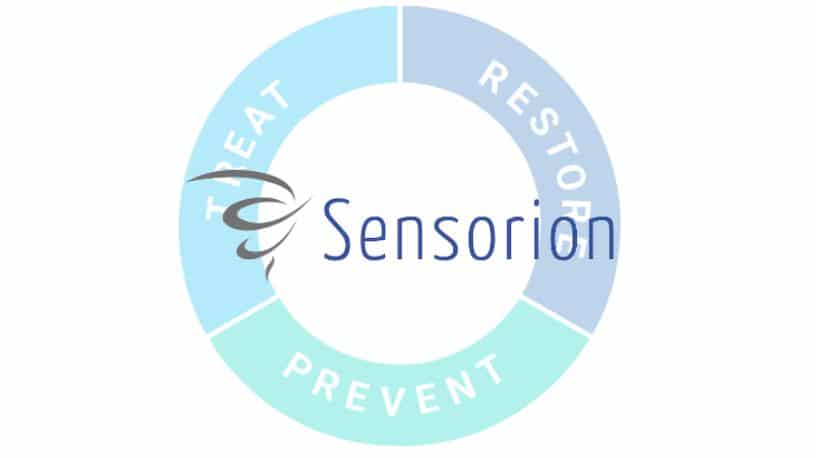MONTPELLIER, FRANCE – Sensorion (FR0012596468 – ALSEN), a pioneering clinical-stage biotechnology company which specializes in the development of novel therapies to restore, treat and prevent within the field of hearing loss disorders, today announces that the initiation of a Proof of Concept (PoC) clinical trial of SENS-401 (Arazasetron) in patients with Cisplatin-Induced Ototoxicity (CIO) has been approved by regulatory authorities in France.
Cisplatin and other platinum-based compounds are essential chemotherapeutic agents for many cancers. A serious side effect of these therapies is ototoxicity, or permanent and irreversible hearing loss, in 50-60% of adult patients and 90% of pediatric patients who survive cancer.
This indication represents a very significant unmet need for patients and is a large market with an estimated incidence of more than 500,000 patients in the United States, the European Union and Japan.
Phase 2a Trial with SENS-401 in CIO
Approval has been granted to conduct a Phase 2a trial with SENS-401 in CIO. Following extensive analysis of the AUDIBLE-S study data earlier in 2022, Sensorion has adapted the design of this trial to focus the prevention of hearing loss.
The exploratory, Phase 2a, multicenter, randomized, controlled, open-label study, NOTOXIS, will evaluate the efficacy of SENS-401 to prevent the ototoxicity induced by cisplatin in adult subjects with a neoplastic disease. The trial will assess several endpoints, including the rate and severity of ototoxicity, the change in the pure tone audiometry PTA (dB) and tolerance. First patient enrolment is expected by end of 2022.
“Cisplatin is an essential and life-saving chemotherapy for millions of patients with cancer. Unfortunately, a devastating side effect for the majority of cancer survivors who have received this therapy is permanent and irreversible hearing loss. We are delighted to have received approval for our clinical trial recently amended with SENS-401, which we believe has the potential to preserve hearing for patients receiving cisplatin.”
—Géraldine Honnet, Chief Medical Officer of Sensorion
About SENS-401
SENS-401 (Arazasetron), Sensorion’s clinical stage lead drug candidate, is an orally available small molecule that aims to protect and preserve inner ear tissue from damage responsible of progressive or sequelae hearing impairment. Sensorion currently develops SENS-401 in a Phase 2a clinical trial for the prevention of residual hearing loss in patients scheduled for cochlear implantation, and in a Phase 2 clinical trial for the prevention of Cisplatin-Induced Ototoxicity. SENS-401 has been granted Orphan Drug Designation by the EMA in Europe for the treatment of sudden sensorineural hearing loss, and by the FDA in the U.S. for the prevention of platinum-induced ototoxicity in pediatric population.
About Sensorion
Sensorion is a pioneering clinical-stage biotech company, which specializes in the development of novel therapies to restore, treat and prevent hearing loss disorders, a significant global unmet medical need.
Sensorion has built a unique R&D technology platform to expand its understanding of the pathophysiology and etiology of inner ear related diseases, enabling it to select the best targets and mechanisms of action for drug candidates. Its portfolio combines both small molecule programs and a preclinical portfolio of inner ear gene therapies. Its clinical-stage portfolio includes one Phase 2 product: SENS-401 (Arazasetron) progressing in a Phase 2 proof of concept clinical trial of SENS-401 in Cisplatin-Induced Ototoxicity (CIO) and, with partner Cochlear Limited, in a Phase 2a study of SENS-401 in patients scheduled for cochlear implantation.
Sensorion pursues its broad strategic collaboration with Institut Pasteur focused on the genetics of hearing. It has two gene therapy programs aimed at correcting hereditary monogenic forms of deafness including OTOF-GT, targeting deafness caused by a mutation of the gene encoding for otoferlin, and hearing loss related to mutation in GJB2 gene to potentially address important hearing loss segments in adults and children (GJB2-GT). The Company is also working on the identification of biomarkers to improve diagnosis of these underserved illnesses.
Source: Sensorion







